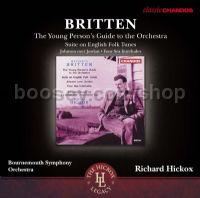Young Person's Guide (Chandos Audio CD)
Young Person's Guide (Chandos Audio CD)
Special Offer
* Estimated price converted from UK retail price
This newly remastered recording presents a varied selection of orchestral works by Benjamin Britten, performed by the Bournemouth Symphony Orchestra under Richard Hickox, to mark the great composer’s centenary year. The disc is also a part of The Richard Hickox Legacy, paying tribute to the conductor and leading advocate of twentieth-century British music.
The Young Person’s Guide to the Orchestra was originally written for the educational documentary film Instruments of the Orchestra. The work passes a theme by Henry Purcell through the instrumental sections in thirteen different variations. After dismantling the orchestra and demonstrating individual aspects of each instrument Britten puts it back together in a dazzling fugue that ends the work.
The Suite on English Folk Tunes, the composer’s last orchestral work, was premiered at the Aldeburgh Festival in 1975 just eighteen months before Britten died. The scoring of this masterpiece is lean and spare, but devastating in effect. The recorded performance was highly commended by Gramophone: ‘The vigour, snap and discipline of this Bournemouth performance are utterly commendable: equally Hickox sees to it that the wistful concluding “Lord Melbourne” touches to the very marrow.’
J.B. Priestley’s Johnson over Jordan was an ambitious experimental play, inspired by the Tibetan Book of the Dead, for which Britten provided an original score. The music in the Suite, assembled by Paul Hindmarsh, captures the mood of the play and is both menacing and mystical, the four movements linked by a ‘death’ motif. The third movement also features a brilliant pastiche of 1930s popular band music, which Hickox, according BBC Music, ‘brings off with great aplomb’.
Composed in 1945, Peter Grimes is one of Britten’s most personal utterances and draws its inspiration from the landscape of Britten’s native county, Suffolk. The Four Sea Interludes, extracted from the opera, are richly evocative of the region’s coastal land- and seascapes. The beginning of the borough day with fishermen returning from sea is portrayed in ‘Dawn’, the glitter of waves speckled with sun and the pealing of church bells in ‘Sunday Morning’, the oppressive heat of a summer’s night in ‘Moonlight’, and the tempestuous seas that lash the coast in ‘Storm’.




